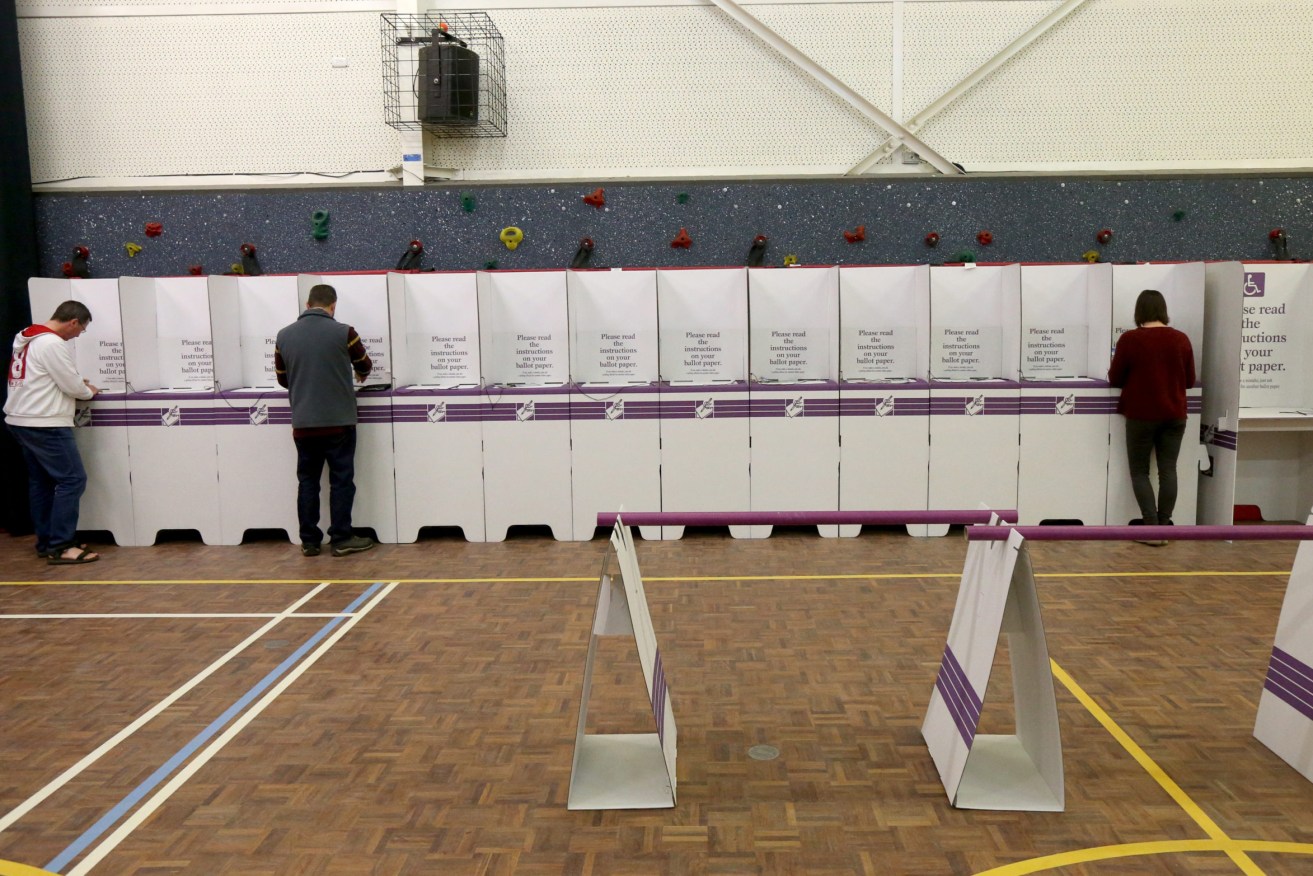Close contacts could leave quarantine to vote in SA election
South Australia’s chief public health officer says she is considering allowing close contacts of positive COVID-19 cases to leave quarantine to vote at polling booths at the March state election, as the number of new cases today increased to 1723, with one death.

Photo: Kelly Barnes/AAP
The 1723 new cases reported in the past 24 hours is a marked increase from yesterday’s 1266 new infections.
Premier Steven Marshall said the surge was likely due to yesterday’s figure being “artificially reduced”, as the hot weather earlier in the week delayed test samples being processed.
“Some of the numbers today relate to that prior period, so there was always going to be a bit of a movement around,” he said.
The number of people in hospital today dropped to 233, including 21 in intensive care and five patients on ventilators.
South Australia also recorded one death, bringing the total since the start of the pandemic to 121 and 117 since the Government opened the state’s borders on November 23.
There were 10,079 tests carried out yesterday – about half of the state’s total daily testing capacity – with Marshall urging those with COVID-19 symptoms to seek PCR testing over rapid antigen testing given to the greater accuracy of the tests.
With the state election looming, chief public health officer Professor Nicola Spurrier said SA Health was working with the state’s Electoral Commission to determine how voting could be carried out in a COVID-safe way.
The Government last month amended the electoral regulations to allow people who are COVID-positive or close contacts to conduct a postal vote.
However, postal voting requires people to apply in advance, meaning those forced to quarantine at short notice could be barred from both postal and in-person voting.
Spurrier said SA Health was working with the Electoral Commission to determine whether close contacts of positive COVID-19 cases could leave quarantine to attend polling booths.
But she said it was unlikely that positive cases would be granted the same exemption.
“It is important if there are large numbers of people who are close contacts or cases that it might have an impact on the election result,” she said.
“Clearly people don’t know ahead of time that they’re going to have COVID, so it’s hard to think ahead of time to make a postal vote and clearly that would be the same for close contacts.
“We will support that (election) as much as we possibly can from a health perspective as we have with many other jurisdictions in different sectors in our community.”
In a statement, the Electoral Commission told InDaily that it was consulting with SA Health on a “raft of measures” to ensure people could safely vote.
A spokesperson said the commission was also speaking to interstate electoral commissions to find out how they conducted elections over the past two years.
The spokesperson said measures agreed to in the 2022 State Election COVID-19 Management Plan include:
- The appointment of a State Election COVID-19 Response Coordinator
- A dedicated hygiene officer at every polling place
- Fully-vaccinated polling officials
- COVID Safe Check-ins via QR codes (or manual)
- Mandatory masks for polling officials and electors
- Social distancing
- Hand sanitising stations
- Queue management
- Frequent and thorough cleaning of high-touch surfaces
- Single use pencils
SA Best today called on Marshall to urgently recall both houses of parliament so that legislative changes could be passed to allow COVID-positive people and their close contacts to safely vote at the election.
The Upper House is scheduled to return on Tuesday, but the Lower House won’t sit before the election.
Last month, Labor and the crossbench called on Marshall to allow emergency sittings on February 8, 9 and 10 to debate the government’s COVID crisis management.
But Marshall didn’t concur, telling InDaily at the time that his focus was “on listening to the experts and keeping SA safe”.
In a statement this morning, SA Best MLC Frank Pangallo said the potential impacts of the pandemic on the state election were “deeply concerning and are above politics”, warning some could miss out on voting.
“That is why I am calling for the urgent recall of both Houses of Parliament – the government can no longer hide behind the security of the Lower House not sitting again until May after the election has been decided,” he said
“The election is going to be extremely close, every vote is going to count – particularly in the marginal seats – so we can’t have a situation where thousands of people are disenfranchised from voting.”
But Marshall this morning told reporters he wouldn’t recall parliament, saying it was up to the Electoral Commission, not the Government, to determine how the election could run.
“Legislation doesn’t go through that period of time – we’ll be in caretaker period soon, it’s only six weeks to the election,” he said.
“Labor and the crossbench had plenty of opportunities to agree to this legislation beforehand.
“It’s unfortunate that they want to play games and not support the very real situation that we’re now confronted with.
“Obviously, this is something that the Electoral Commissioner will now have to deal with.”
Opposition Leader Peter Malinauskas said it was “incredibly disappointing” that Marshall had once again ruled out recalling parliament.
“On something as important as the democratic process in the lead up to the election, we see the Premier yet again trying to use the pandemic for his own political benefit,” he said.
“Only weeks away from the election and Steven Marshall is refusing to allow the Lower House of parliament to do its job, pass a law that has already passed through the Upper House that would seek to address the issue of thousands of people potentially missing out on the chance to vote.”
The Bill would grant state emergency coordinator Grant Stevens the authority to allow certain people to vote over the phone or electronically.




